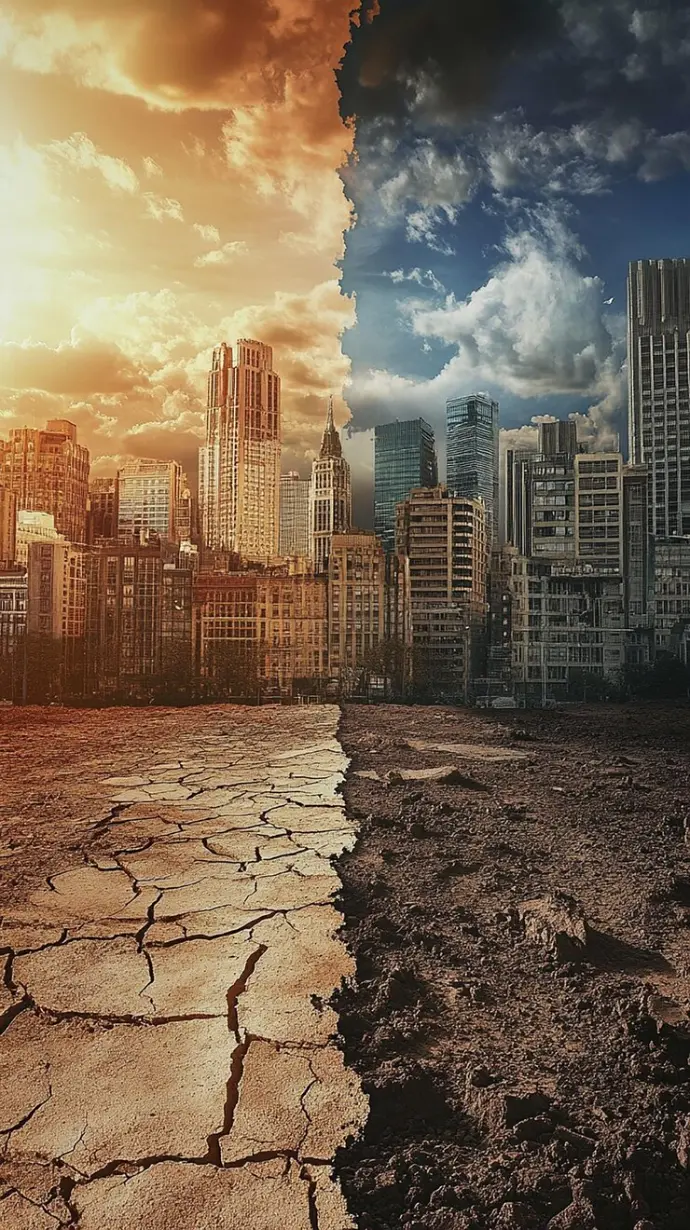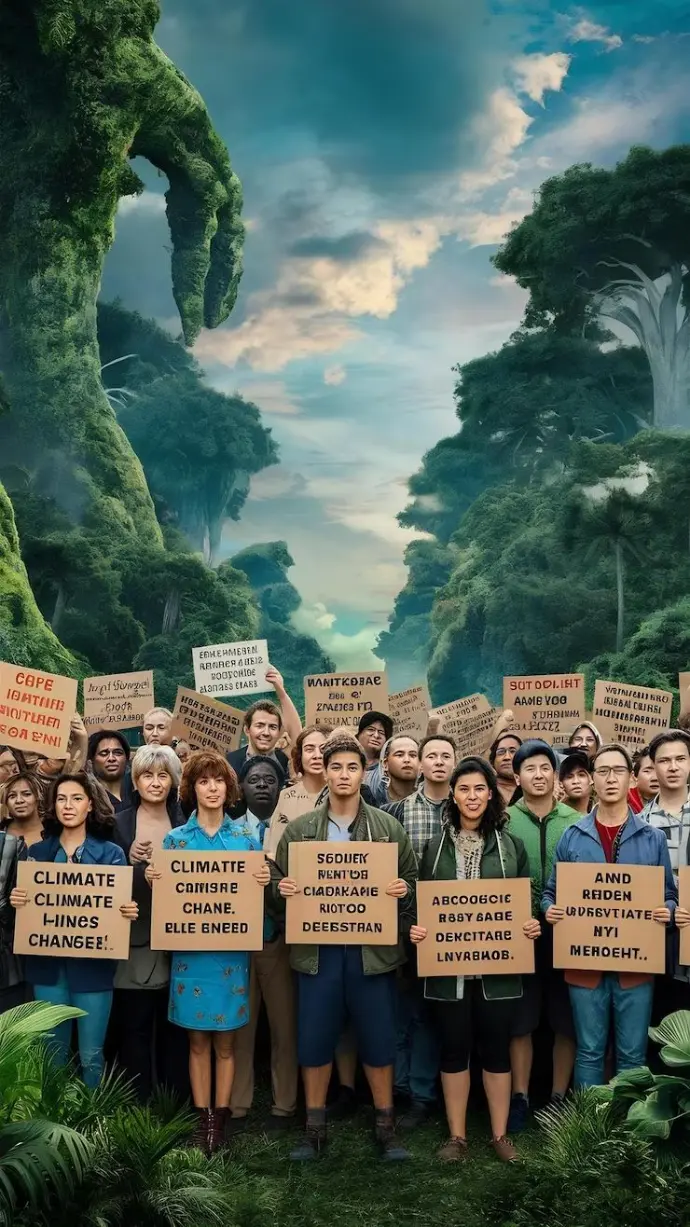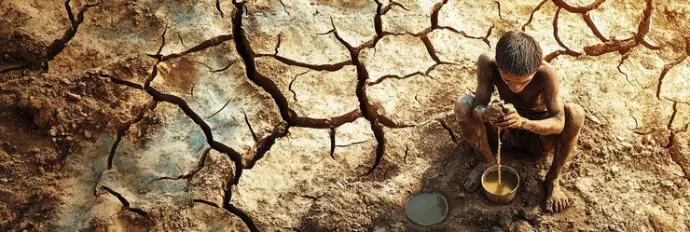In our feature article, "Climate Conflicts: The Geopolitics of Climate Change and Human Rights," we will examine the complex connection between geopolitics and climate change and how this directly affects human rights around the world. How do these climate conflicts impact the most disadvantaged communities? Immerse yourself in the geopolitics of climate change and understand how it relates to human rights advocacy!
Introduction
When it comes to human rights and climate change, it is crucial to study the geopolitics of climate change and its connection to human rights at the global level. This detailed analysis helps understand how geopolitical elements can contribute to reducing or exacerbating the effects of climate change on the most vulnerable communities, as well as promoting policies that ensure the protection of the basic rights of all people.
The geopolitics of climate change examines how geographical, political, economic, and social factors influence the responses of different countries and global actors to climate change and its effects. This field of study investigates how decisions made by various nations and regional groups affect the distribution of the consequences of climate change, as well as the implementation of adaptation and prevention strategies.
The connection between the geopolitics of climate change and human rights is fundamental, as geopolitical decisions can directly or indirectly impact the protection or violation of people's basic rights, particularly those residing in areas most vulnerable to climate effects. The unequal distribution of natural resources, access to technology, and the ability to cope with natural disasters are examples of how geopolitics related to climate change can influence the protection of human rights.
Therefore, it is essential to understand and assess the geopolitics of climate change to identify how global policy decisions can affect communities' ability to protect their rights in the context of accelerated climate change.
Climate justice, understood as the search for balance in the way the impacts and responsibilities of climate change are distributed, becomes especially important in relation to human rights. The vulnerability of certain groups to the effects of climate change and the inequality in their capacity to adapt and protect themselves present ethical and legal challenges that require attention from a climate justice perspective.
The connection between climate justice and human rights involves ensuring that actions taken to combat climate change are environmentally effective, but also that they respect and protect the rights of all people, especially those in situations of greater vulnerability. Promoting climate justice helps ensure that climate change policies and decisions do not exacerbate existing inequalities or violate the rights of individuals.
In this context, addressing climate justice in relation to human rights requires recognizing and responding to the needs of the communities most affected by climate change, as well as ensuring their active participation in decisions that impact their environment and quality of life.
Over time, the connection between geopolitics, climate change, and human rights has shifted, fueled by significant transformations in how the effects of climate change are perceived and in the way governments and global organizations have addressed this issue.
The origins of this connection can be traced back to the first international conversations about climate change, where the need to include geopolitical and human rights aspects in the design of environmental strategies and policies began to be recognized. In recent decades, growing awareness of how climate change unequally affects different regions has led to the integration of geopolitical and human rights considerations into international agreements and protocols related to climate change.
Today, the development of this connection is reflected in the urgency of applying interdisciplinary approaches that combine geopolitics, climate change, and human rights in global decision-making. This progress demonstrates a clearer understanding that effectively combating climate change requires considering not only its environmental impacts, but also its geopolitical consequences and its effect on the human rights of people globally.
The geopolitical impact of climate change on vulnerable communities is significant and broad. Groups already facing vulnerability, such as those residing in coastal areas or places prone to natural disasters, are the most impacted by the consequences of climate change. Their scarcity of resources and limited capacity to adapt to environmental changes make them especially vulnerable to the adverse effects of rising temperatures, extreme weather events, and rising sea levels. The struggle over scarce natural resources, such as water and arable land, resulting from these changes can increase tensions and lead to conflict within these communities.
Furthermore, international climate-related politics can cause large movements of people, which can lead to conflict and tension in the areas hosting these groups. People in vulnerable situations face great difficulties in seeking safety and rebuilding their lives in new environments. The scarcity of effective and clear policies to address climate-related displacement, both nationally and internationally, further worsens the situation for these people. Ultimately, the impact of climate change policy on vulnerable communities highlights the urgency of a holistic approach that recognizes and addresses the complex connections between environmental change, conflict, and human rights.
Furthermore, the limited involvement of these communities in local, national, and international decision-making also increases their vulnerability. The lack of representation and voice in climate negotiations and policymaking leaves these communities marginalized and exposed to decisions that can have profoundly damaging effects on their lives and livelihoods. It is critical that this power disparity be recognized and addressed to ensure that vulnerable communities have the opportunity to influence decisions that directly affect their lives and futures within the context of the geopolitics of climate change.
Geopolitics of Climate Change and Human Rights
The connection between the geopolitics of climate change and the defense of human rights is becoming increasingly clear, as the effects on the environment impact communities globally. Aspects of climate change, such as water shortages, rising sea levels, and soil erosion, directly affect people's ability to access their fundamental human rights, including the availability of food, clean water, and a healthy environment.
Furthermore, the geopolitics of climate change is central to involuntary migration, struggles over natural resources, and economic inequalities, which in turn impact the protection of human rights internationally. Competition for natural resources in areas vulnerable to climate change can intensify geopolitical tensions and lead to human rights violations in those areas. Therefore, it is crucial to address the link between the geopolitics of climate change and the defense of human rights through environmental policies and global agreements that seek to reduce the effects of climate change and safeguard the rights of affected communities.
Environmental policies, both locally and globally, have important geopolitical consequences for the defense of human rights. Pacts on climate change, natural resource management, and pollution control directly influence people's daily lives and the way power is distributed around the world.
The way countries negotiate and fulfill their environmental commitments can affect communities' ability to safeguard their human rights. For example, policies that incentivize the transition to renewable energy can improve air and water quality, thus benefiting people's health and well-being, especially among vulnerable groups.
From a geopolitical perspective, environmental policies can also transform relations between nations, international collaboration, and the way resources are distributed, impacting the protection of human rights internationally. For this reason, it is essential to assess the geopolitical implications of environmental policies when considering the defense of human rights in the context of climate change.
The use of natural resources in geopolitical settings presents significant challenges for safeguarding human rights. The struggle for control and use of resources such as oil, gas, minerals, and water can result in local conflicts, the involuntary displacement of populations, and human rights violations in affected areas.
Furthermore, natural resource extraction is often associated with geopolitical power relations, where the interests of powerful states can be prioritized over the needs and rights of local communities. This situation can intensify inequality, poverty, and exclusion, which, in turn, undermines the defense of human rights in particular geopolitical contexts.
To address the human rights consequences of natural resource extraction, it is essential to create policies and governance systems that promote equity, sustainability, and respect for the rights of local communities in geopolitical settings. This entails reflecting on the long-term effects of natural resource exploitation on the advancement of human rights and working toward more just and sustainable management of these resources globally.
Governments and international organizations have taken several actions to address climate justice from a human rights perspective. First, summits and international agreements, such as the United Nations Climate Change Conference (COP) and the Paris Agreement, have been held, seeking to establish binding commitments to reduce greenhouse gas emissions and adapt to climate change. These efforts aim to protect the human rights of the communities most affected by climate change, such as the right to life, health, a healthy environment, and access to water.
Furthermore, governments and international organizations have launched cooperation and technical assistance programs to strengthen the capacity of developing countries to address the challenges of climate change and safeguard the human rights of their citizens. These initiatives include technology transfer, financial support, and the promotion of sustainable practices in crucial sectors such as agriculture, energy, and natural resource management.
Furthermore, monitoring and accountability systems have been implemented to review compliance with commitments related to climate change and human rights. These systems aim to ensure that governments and organizations fulfill their responsibilities and take effective action to safeguard the rights of people impacted by climate change, particularly those in vulnerable situations.
Challenges and Opportunities
Climate change is considered one of the greatest challenges to safeguarding human rights worldwide. Bridging the geopolitics of climate change with human rights faces significant difficulties, as political decisions frequently prioritize economic and geopolitical interests over the defense of the environment and at-risk communities. The complex nature of international agreements and the lack of effective enforcement mechanisms also complicate the protection of human rights in relation to climate change.
Furthermore, the unequal distribution of the effects of climate change intensifies human rights violations, especially among marginalized populations and developing countries. Difficult access to resources and susceptibility to natural disasters highlight the urgent need to address the connection between the geopolitics of climate change and human rights through more inclusive and equitable methods.
To address these challenges, it is essential to foster an approach that integrates different sectors and includes human rights in all geopolitical decisions related to climate change. Promoting evidence-based policies, enhancing international cooperation, and strengthening affected communities are crucial steps to effectively combine the geopolitics of climate change with the global defense of human rights.
Despite the challenges, there are important opportunities to promote climate justice and safeguard human rights globally. Growing awareness of the connection between climate change and human rights has led to progress in including these rights in geopolitical climate discussions.
Civil society mobilization, pressure from community movements, and action by human rights defenders have helped put the need to address climate justice from a human rights perspective on the agenda. Similarly, recognition of the importance of citizen participation in climate-related geopolitical decision-making has created opportunities to include diverse voices and adopt more inclusive and fair methods.
The creation of policies that ensure the defense of human rights in the context of climate change, the promotion of sustainable technologies, and international cooperation in climate change mitigation and adaptation are key opportunities to advance climate justice and the protection of human rights globally.
To understand the complicated connection between the geopolitics of climate change and human rights, it is essential to examine key examples of climate conflicts from an intersectional perspective. These examples can include disputes over natural resources, forced displacement due to climate disasters, and geopolitical conflicts linked to resource exploitation in areas that are especially vulnerable to climate change.
A notable case is the displacement of indigenous populations in Latin America, caused by forest clearing and the growth of the extractive industry. This highlights how geopolitics, climate change, and human rights are interrelated. Furthermore, tensions over access to water in arid and semi-arid areas highlight the need to consider geopolitical and human rights aspects when managing water resources in the context of climate change.
A thorough study of these key examples helps identify patterns, challenges, and opportunities for effectively integrating the geopolitics of climate change with the defense of human rights worldwide, offering valuable lessons to guide future policies and approaches.
Actions and Strategies
The connection between climate change-related geopolitics and human rights has driven the development of international policies and agreements designed to address this global challenge. One of the most significant agreements is the Paris Agreement, which aims to keep the global temperature increase below 2°C, with additional efforts seeking to limit it to 1.5°C. This pact motivates countries to reduce their greenhouse gas emissions and work together to adapt to the effects of climate change. Furthermore, the United Nations 2030 Agenda for Sustainable Development, especially Sustainable Development Goal 13, focuses on climate action to combat climate change and its consequences.
Likewise, the United Nations Framework Convention on Climate Change (UNFCCC) is an international agreement that seeks to stabilize greenhouse gas concentrations in the atmosphere. Through this treaty, various annual conferences, called Conferences of the Parties (COPs), are held where countries meet to discuss and negotiate how to address climate change and protect human rights in this context.
These international agreements and policies are essential for creating a collaborative framework that promotes climate justice and safeguards human rights in geopolitical settings.
Human rights defenders have played a fundamental role in advocating for the defense of human rights in the midst of climate crises. They have suggested actions that seek to ensure that communities affected by climate change have fair and meaningful participation in the formulation of environmental and climate policies. They have also advocated for the implementation of strategies that provide protection to the most vulnerable groups, such as indigenous communities, rural areas, and those who migrate for climate reasons.
The human rights defenders' recommendations also contemplate promoting climate justice by holding companies and governments responsible for excessive greenhouse gas emissions accountable. They also seek human rights-based solutions to address the effects of climate change on people's lives.
These actions and suggestions highlight the relevance of the work carried out by human rights defenders in safeguarding human rights in the context of climate conflicts and geopolitics related to climate change.
To advance climate justice and ensure the defense of human rights in geopolitical contexts, it is essential to implement strategies that combine diverse and cross-cutting approaches. These strategies must include international collaboration to comprehensively address the challenges of climate change and its effects on human rights, as well as the mobilization of funding and technical resources to facilitate adaptation and mitigation of climate change in the most exposed countries.
Furthermore, it is vital to encourage the active participation of affected communities in decisions regarding climate and environmental policies, as well as in the implementation of adaptation and resilience actions. Promoting environmental education and improving skills related to climate change are also fundamental steps to empower communities and ensure the defense of their human rights in geopolitical contexts.
These strategies seek to create a solid framework for advancing climate justice and defending human rights, recognizing the connection between the geopolitics of climate change and human rights globally.
Conclusions
The future influence of climate change-related geopolitics on global human rights is a very important issue. As the effects of climate change continue to impact various areas of the planet, human rights are expected to face various threats. For example, the increase in the number of displaced people due to severe weather events such as storms, floods, and droughts can lead to disputes over limited resources, affecting access to food, water, and housing. Furthermore, rising sea levels put entire communities at risk, threatening their right to a healthy and sustainable environment.
It is essential to understand how the geopolitics of climate change can intensify existing inequalities and vulnerabilities, and how this will impact global human rights in the future. The international community must be prepared to address these challenges in advance, considering the geopolitical repercussions of climate change-related decisions. Governments, international organizations, and civil society are responsible for collaborating to anticipate and reduce the potential effects of the geopolitics of climate change on human rights worldwide, focusing on protecting the most vulnerable and marginalized groups.
Integrating climate justice into international human rights agendas is essential to ensure that responses to climate change are just and respect the human rights of all people. Climate justice recognizes that the communities that suffer most from climate change are often those that have contributed least to the climate crisis, while more developed countries have been responsible for the majority of greenhouse gas emissions. By including climate justice in international human rights agendas, we seek to ensure that actions taken to combat climate change do not exacerbate existing inequalities and that the fundamental rights of all people are safeguarded, including the right to a healthy environment, the right to life, the right to health, and the right to an adequate standard of living.
Furthermore, integrating climate justice into international human rights agendas encourages the active participation of affected communities in decision-making processes, recognizing their knowledge and experience to create effective and sustainable solutions. This helps strengthen environmental governance and promote global solidarity in the fight against climate change.
The next steps to address climate conflicts from a human rights and geopolitical perspective require a comprehensive and collaborative global strategy. Improving methods of dialogue and cooperation among nations is crucial to address the root causes of climate conflicts and their impact on human rights. This means promoting peace, security, and climate justice as connected elements for an effective response to climate change.
Furthermore, it is essential to ensure that governmental and non-governmental actors that contribute to climate change and its negative effects on human rights are held accountable. This can be achieved through the implementation of both international and national legal norms, as well as monitoring and reporting systems that ensure that human rights and climate change commitments are fulfilled.
Finally, it is crucial to foster collaboration and offer financial support to the most vulnerable communities, providing them with the necessary resources to adapt to the effects of climate change and to actively participate in decisions that impact their lives and their environment. This will help strengthen these communities' capacity to resist and ensure that their human rights are safeguarded within the context of climate conflicts.

 IHRO NEWS
IHRO NEWS


